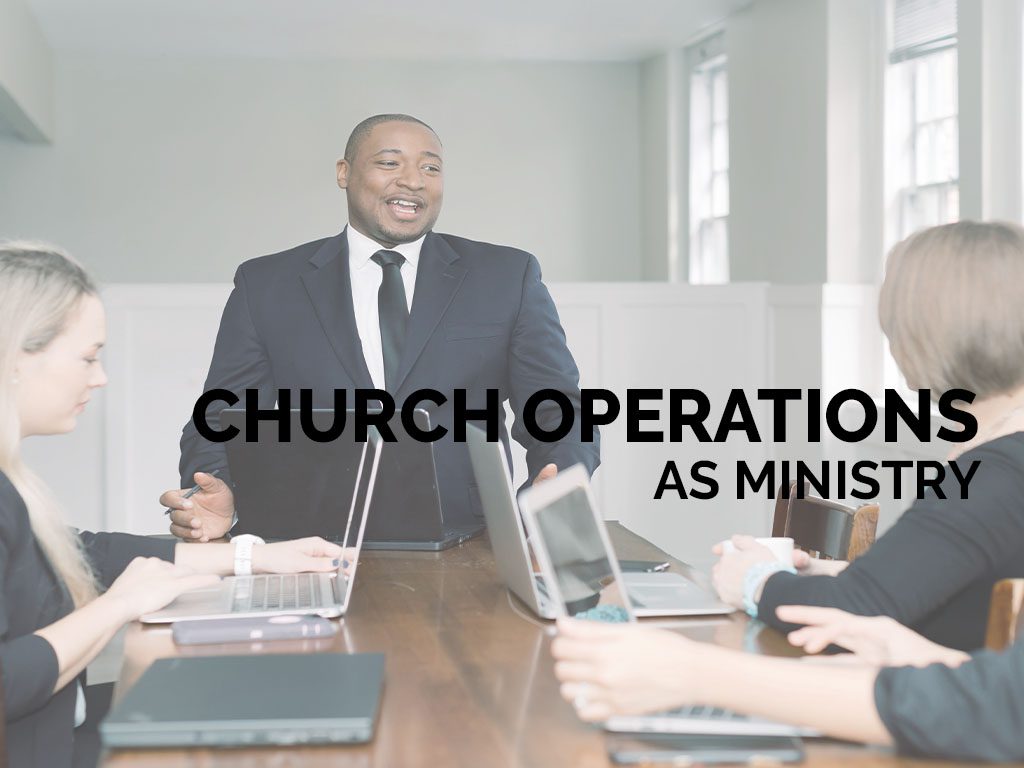When we think of ministry, we tend to visualize a pastor preaching a sermon or elders praying with someone at the altar. What doesn’t often come to mind are tasks like proper HVAC maintenance, developing procedures for children’s check-in, or paying the utility bills. However, these efforts help make Sunday services possible. It’s time to think of church operations as a ministry.
How is church operations part of ministry?
#1 – Financial Stewardship
While money isn’t our main ministry focus, it is necessary to keep the lights on and run various aspects of the church. To ensure excellent stewardship of church finances, someone has to oversee the financial records and associated policies and procedures. This includes:
- Establishing a proper process for counting and recording offerings
- Tracking departmental budgets
- Maintaining good accounting controls
- Providing insight into the financial status of the church
- Selecting accounting software that supports these efforts
#2 – Human Resources
People are at the heart of what we do in ministry. Therefore, churches should lead the way in how they treat their employees. Maintaining excellent human resources policies and practices is part of church operations ministry. Most churches have at least a few staff members. When you have employees, you’ll need to establish and enforce HR policies, facilitate payroll, handle hiring and firing processes, and more.
#3 – Insurance Coverage
There are several types of insurance a church may need at any given time. This may include:
- Employee health insurance
- Church liability insurance
- Vehicle insurance
- Property insurance
- Special event insurance
Proper insurance coverage protects the church’s finances in case of a natural disaster, accidents, and other issues. Maintaining the right levels and types of insurance is one way church operations team members steward church finances well.
#4 – Technology
We depend on technology to host online church services, connect with congregants during the week, and more. Churches need someone to oversee the procurement, installation, and maintenance of that technology to keep it running smoothly. This includes overseeing the following:
- Computers
- Hardware
- Software and software subscriptions
- Email systems
- Any internal networks
- Church website
#5 – Church Management Software
Church Management Software (ChMS) can be an incredible tool for maintaining donor records, tracking discipleship program progress, coordinating small groups, and much more. However, it requires someone to ensure the software selected works well for the church and that everyone uses it appropriately.
#6 – Facility Management
If your church owns a building, you need to maintain it well to ensure it lasts for a long time. Many churches have a designated Facilities Manager to maintain facilities, coordinate room set up for various services and events, oversee any repairs or building projects, and more. An effective maintenance program can save the church money, prolong the life of the facilities, and keep them looking welcoming to all who attend.
#7 – Project Management
Many churches do not have a standard process for managing all the tasks required to complete a project. However, every church has projects of some sort. Building remodels, special events, and efforts to refresh policies and procedures, are all examples of potential projects. A church that has a standard process for leading all projects will reduce costs, save time, and increase the effectiveness of each project.
#8 – Security
Unfortunately, bad guys don’t consider churches off-limits. As a result, church leaders must consider how to secure people, facilities, and valuables. This may involve emergency response planning, including the installation of locks, safes, and security cameras.
#9 – Volunteer Management
Finally, a church needs a dedicated team of volunteers to grow and thrive. The process of inviting people to serve, assigning them to a volunteer role, providing training, and expressing appreciation must be consistent and well-established.
With so much falling under “Church Operations,” it’s challenging for any one person to effectively oversee such a wide variety of responsibilities. However, that’s what many churches expect their Senior Pastor, Executive Pastor, Operations Director, or Church Business Administrator to do.
To support anyone facing this massive array of tasks, The Church Operations Toolkit includes templates, resources, and subject matter expert interviews in each of these categories. If you’ve been tasked with managing some or all of these areas, The Church Operations Toolkit is an excellent resource to save you time, money, and headaches along the way.
Below is a list of articles we’ve published in the past on this topic:
Top 20 Church Management Software [Infographic]
Faith Teams Church Management Software [Review]





Ephesians 4:11
And He Himself gave some to be apostles, some prophets, some evangelists, and some pastors and teachers, FOR THE EQUIPPING OF THE SAINTS for the work of ministry, for the edifying of the body of Christ,
God places “Volunteer Management” at the top of the list. Your article places it at the bottom of the list.